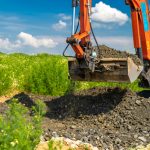 Excavation projects are a crucial part of construction and development. However, it is imperative to consider the environmental impact of such activities to ensure the preservation and protection of our ecosystems. In this blog post, we will explore some important environmental considerations that should be taken into account during excavation projects.
Excavation projects are a crucial part of construction and development. However, it is imperative to consider the environmental impact of such activities to ensure the preservation and protection of our ecosystems. In this blog post, we will explore some important environmental considerations that should be taken into account during excavation projects.
1. Environmental Impact Assessment
Before undertaking any excavation project, conducting an environmental impact assessment (EIA) is essential. An EIA assesses the potential environmental consequences of the project and identifies measures to mitigate negative impacts. It examines factors such as air and water quality, noise pollution, biodiversity, and heritage preservation. An EIA helps ensure compliance with environmental regulations and promotes sustainable practices for minimizing harm to the environment.
2. Preservation of Natural Habitats
Excavation projects often involve clearing vegetation and disturbing natural habitats. It is crucial to prioritize the preservation of native plants, trees, and wildlife within the project site. Where feasible, efforts should be made to transplant or relocate endangered or sensitive species to areas that will not be affected by the excavation. Mapping of ecological features, such as wetlands or wildlife habitats, is essential to guide the excavation process and protect these delicate environments.
3. Soil Erosion and Sediment Control
Excavation activities can lead to soil erosion and sedimentation, which can have harmful effects on nearby water bodies. Implementing erosion and sediment control measures is vital to prevent excessive sediment runoff. Techniques such as sediment barriers, silt fences, and erosion control blankets can help retain soil and minimize the impacts of erosion. Proper stormwater management systems should also be in place to capture and filter runoff before it enters waterways.
4. Water Protection and Management
Excavation projects can impact water quality through activities such as dewatering, construction runoff, and accidental spills. It is crucial to protect water resources by implementing effective measures. This includes proper containment and filtration systems for dewatering activities, the installation of sediment basins to capture runoff, and the use of environmentally friendly construction materials to minimize contamination risks. Regular monitoring of water quality during and after excavation is essential to ensure compliance with regulatory standards and protect aquatic ecosystems.
5. Noise and Dust Control
Excavation activities can generate excessive noise and dust, which can be disruptive to nearby communities and environmentally harmful. Employing measures to control these impacts is crucial. Using equipment with noise-reducing features, enclosing work areas with sound barriers, and implementing dust suppression techniques, such as water sprays or dust control additives, can help minimize these environmental disturbances. By mitigating noise and dust emissions, excavation projects can limit their impact on the surrounding environment and promote a healthier living environment for nearby communities.
6. Waste Management and Recycling
Excavation projects often generate significant amounts of waste materials. Implementing proper waste management practices is crucial to minimize the environmental impact. This includes sorting and recycling materials such as concrete, asphalt, bricks, and metals. Additionally, hazardous materials should be handled and disposed of according to regulations to prevent soil and water contamination. Adopting recycling and waste reduction practices not only helps protect the environment but also contributes to sustainable construction practices.
7. Reclamation and Restoration
After completion of the excavation project, reclamation and restoration efforts should be undertaken to restore the site’s ecological function and aesthetics. This may involve reintroducing native vegetation, creating wildlife habitats, and stabilizing slopes and drainage patterns. Reclamation and restoration activities aim to bring the site back to its original or improved state, ensuring that the ecological balance is preserved and that the land remains usable for future generations.
Conclusion
Environmental considerations play a crucial role in the success and sustainability of excavation projects. By taking into account factors such as environmental impact assessments, preservation of natural habitats, erosion and sediment control, and water protection measures, excavation activities can be carried out in a way that minimizes harm to the environment. Additionally, proper waste management, noise and dust control, and reclamation efforts contribute to sustainable practices and promote a healthier and more eco-friendly construction industry. By prioritizing these environmental considerations, we can ensure that our excavation projects respect and protect the environment for the benefit of present and future generations.
Got Questions? Let Us Help!
At Randy Roan Construction Inc., we work hard to ensure our quality work is done in a timely manner. We provide services such as land clearings, site utilities, and asphalt paving along with many other services. We guarantee your customer satisfaction with our work here at Randy Roan Construction Inc. So give us a call today!

